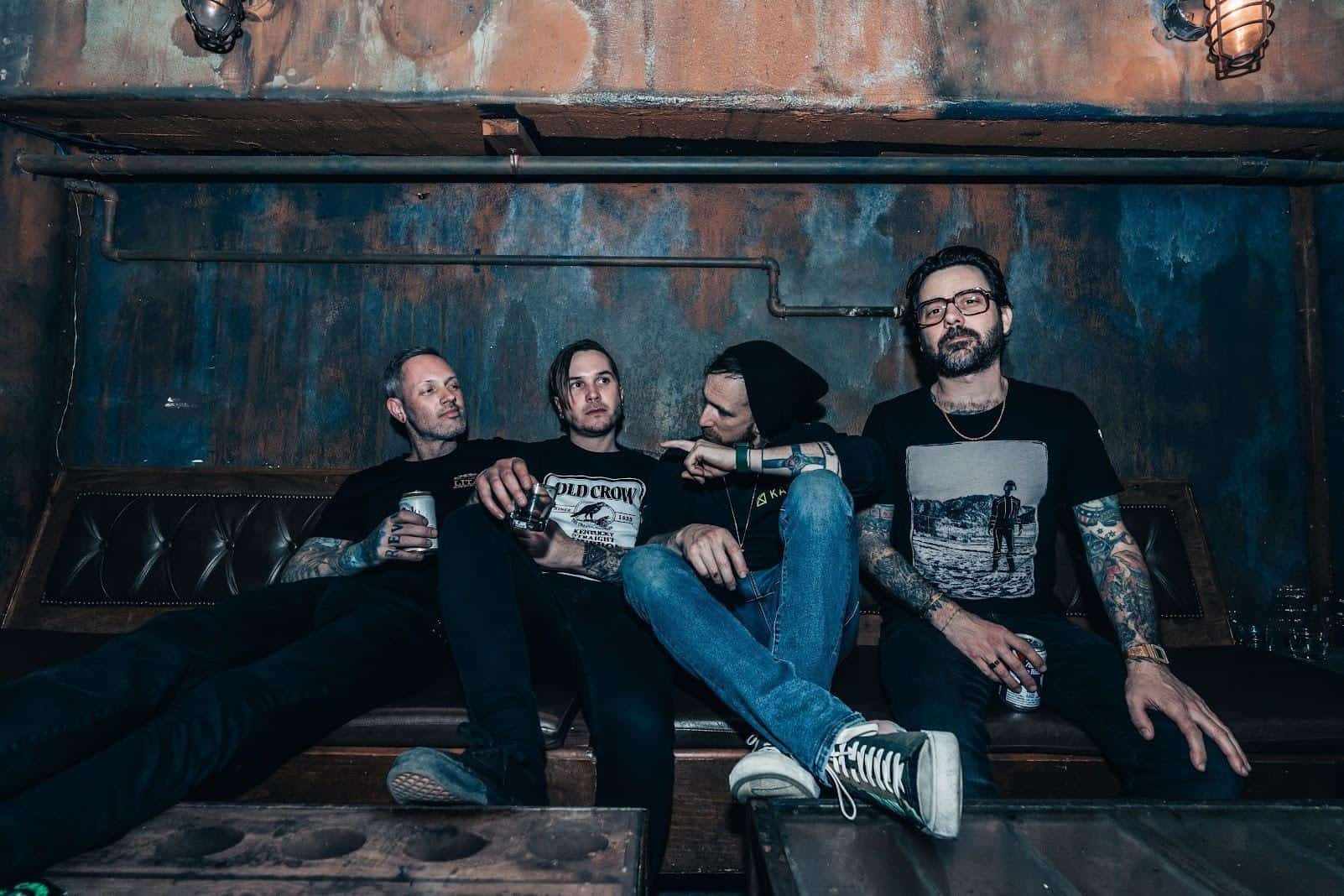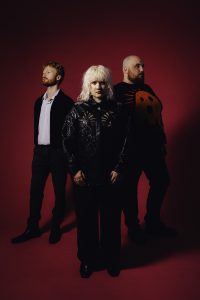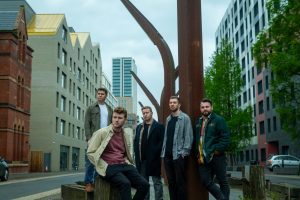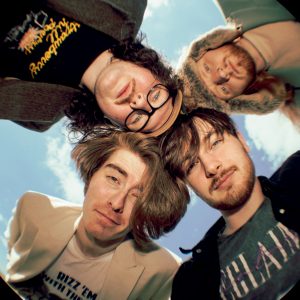Few bands embody the essence of determination, grit, and tenacity quite like Lone Kodiak. This East Los Angeles outfit has not only carved a niche for themselves in the alt-rock scene but has also etched their name into the annals of bands that relentlessly push the envelope. Their journey is a testament to resilience, a narrative punctuated by their steadfast commitment to musical evolution and personal growth. And at the heart of this narrative is Daniel Alden, the bassist whose personal story mirrors the band’s ethos of perseverance and strength.
Over the past year, Lone Kodiak has journeyed through a creative odyssey, marked by a series of releases that speak volumes of their artistic maturity and depth. From the introspective lyrics of “Let’s Hear it for The Kid” to the visceral energy of “Make It A Weapon (Catastrophzr Version),” each track has been a milestone in their journey, showcasing their ability to adapt, evolve, and thrive amidst a sea of change. The release of “Werewolf Girl!” in October further solidified their status, offering a compelling blend of narrative and melody that resonates with the band’s signature style. And now the band’s latest single, the titanic, impudent “Inner Monologue,” comes with the greatest news yet: their debut full-length album, If We Have A Future, is slated for release early next year.
In this exclusive interview, Alden opens up about his life, the challenges he’s faced, and the triumphs he’s celebrated. His story is one of remarkable resilience, reflecting the band’s overarching narrative. From his transformational journey to veganism to the life-altering motorcycle accident, Alden’s experiences underscore the themes of endurance and rebirth that are so central to Lone Kodiak’s identity.
As you delve into this conversation, you’re invited to witness the personal reflections of a musician whose life is as layered and profound as the music he helps create. This is more than just an interview; it’s a glimpse into the soul of a band that continues to inspire and captivate. Join us as we explore the world of Lone Kodiak through the eyes of Daniel Alden, and discover the unwavering spirit of a band that continues to redefine the boundaries of alternative rock.
So Parker and you are both vegan, is that right?
Alden: Yeah.
How comfortable are you with talking about it?
“Oh, very open. I mean, it’s a big part of our lives, and I’ve been vegan for probably about 11 years now.”
What led up to you making that decision?
“I moved to Los Angeles with Parker about 11 years ago. His roommate at the time, who’s now his wife Nari, where both vegan.
“I was recovering from some hard drugs, and they basically brought me back to life. Part of that recovery was adopting a vegan diet.”
Are you comfortable sharing that component? How would you prefer I phrase it—getting clean, or something else? Everyone has different terms.
“I’m very open about everything. You can literally say anything you want about it. I can tell you the drugs, how long I was on them—any of that’s fine with me. The point is, I got over it and moved forward.
“The diet was a huge part of it for me. I lost probably 70 pounds. I have old pictures that are really crazy to see; I look like a different person. And yeah, I feel great, so I just—”
Kept with it. That’s awesome. And is the ethical component less of a factor for you, or has that come into play since then?
“Absolutely, I’m a big animal lover. Always have been, but this experience definitely opened my eyes.
“We’ve been involved with animal rescue farms—I’ll have to get the name from Parker—but we go visit animals that have been rescued, feed them, pet them. I just can’t eat them anymore; it doesn’t sit right with me.”
And what do you say to people who have strong opinions either way? Do you think there’s value in actively and vocally advocating for veganism?
“For me, I try not to judge people on anything they do or push my beliefs on anyone. This is something I personally believe in. Slaughterhouses, for instance, are terrible for our environment. I don’t really have a good answer for that question. Parker would be better at answering that.” [laughs]
So it’s more like a personal creed for you, rather than something you actively promote? I’m trying to figure out if you’re someone who believes in pushing that message, as opposed to just living it.
“Absolutely, it’s more of a personal thing for me. I try not to push my beliefs on anyone else. I think it’s the right way to live, and it benefits all, but I won’t push that on to anyone.”
What’s a misconception you wish you could address, in a perfect world?
“Being vegan is not hard. People think it’s difficult to make that change, but it’s not—especially in places like Los Angeles. Even when I travel abroad, like to the UK, they have vegan months with different vegan options in all kinds of restaurants. Fast food places there have better vegan options than we do here. So, in LA especially, it’s so easy. It’s everywhere.”
I was curious about your background coming into this band. Are you comfortable talking about the motorcycle accident?
“Absolutely. When I first moved here, Parker had a motorcycle. I grew up riding four-wheelers and dune buggies on the sand dunes in Oregon, but never rode street bikes. So naturally, I got a bike and we rode together. It was amazing. I even started building motorcycles and got a couple of jobs doing that here in L.A. Then in 2018, I was sideswiped by an 18-year-old girl who was on her cellphone in her mom’s car. My hand went into her taillight, and since I wasn’t wearing gloves, it severed my two middle fingers—bones sticking out, tendons split. After flying over the handlebars, I looked for my fingers and found them dangling from the bottom of my hand.”
That’s so intense. How old were you when this happened?
“It was 2018, so I was around 35 or 36. I’m not doing the math right now.”
What was her reaction to the accident?
“Her immediate response was, ‘I was not on my cellphone.’ Those were the first words out of her mouth.”
Seriously?
“Yeah. Didn’t ask how I was doing or anything. Just yelled out, ‘I wasn’t on my cellphone.’ Which obviously indicates she was. This happened in front of a polling place on November 8, the day of the vote, so I had over 30 witnesses. That worked in my favour.”
No kidding. How did the police respond?
“They said it was my fault. For the record, I hate cops. They told me I was speeding, which was baseless. Their report contradicted itself, and my lawyer even asked if they’d read it because it made no sense.”
That’s absurd. What recourse did you have? I assume you didn’t have insurance at the time?
“No, I didn’t. I was actually on my friend’s bike because I was rebuilding mine. Totaled his bike. My hand was so messed up, I wasn’t sure if I’d play again. I can’t work as a mechanic anymore. If I work on bikes for a day, my hand is sore the next.”
May I ask which hand we’re talking about?
“It’s my dominant hand. I can’t fully close it anymore, but I can still ride and play.”
Well, that’s what matters most at the end of the day.
“Exactly.”
I mean, even riding doesn’t matter at the end of the day, but being able to play music is everything.
“Absolutely. Music is my lifeline.”
So right after the accident, you’ve got your fingers hanging off, and she’s immediately denying she was on her cellphone. Where do the police come into the picture? I assume you needed immediate medical attention.
“Cops arrive, pull my bike off the road. I’d already propped my hand up to reduce blood loss. I’ve been injured enough to know the drill. Ambulance comes, takes me to the hospital. They make me do a drug test and contact the bike’s owner to make sure it wasn’t stolen before treating me.”
Hold on. They conducted a drug test and verified the bike’s ownership before administering medical aid?
“Yeah, exactly.”
I assume this hasn’t improved your opinion of emergency services in East LA?
“It didn’t need to. I’ve always had issues with them. Though I should clarify, the ambulance crew was fine. It’s the police who are the problem.”
Did you have a lot of run-ins with the police when you were younger?
“Oh, you could say that. Parker would back me up on that.”
Who among the three of you has had the most problems with the police?
Alden: “Parker.”
Parker: “Definitely me.
“I chained the cop’s gate shut, called in a bomb threat, and super-glued their padlock. Just to mess with them. Alden saw me get arrested once. Made fun of the cops so much he almost got arrested himself. But it was good for our reputation; people started seeing us as wild.”
Alden: “Yeah, that was a long time ago.”
Josh, what about you? Have you had many run-ins with the police?
Josh: “Not really. A few minor things. Got caught sneaking out during middle school, almost ruined Christmas. Cops in Florida would give me warnings, but in New York, it’s straight to tickets. So, nothing as crazy as what these guys have been through.”
That’s wild to me that a Floridian is not catching ‘bows from the cops.
Alden: “They’re just lazy down there. ‘You’re not doing anything serious, you’re making more work for me, so I’m gonna just forget about this.”
Parker: “I had a fun run in with a cop in Florida. I got pulled over leaving, a super drug-infested neighborhood, like, the worst neighborhood in Orlando. And I had been going to church at the time, I’d volunteered with them, and this cop was like, ‘I know you have drugs in your car.’
“Now what’s funny is, I literally had a letter from my church thanking me for my volunteering work. But when I gave him that he was like, ‘Well, that doesn’t really help. Last person I arrested was a priest and it was for raping a child,’ and I was like, ‘Good Lord dude.’
“So then I’m like, ‘Why don’t you just search my truck? Like, just search it.’ He’s like, ‘Oh, you’re giving permission?’ I’m like, Yes, please. Can we get this over with.
“Yeah, that was wild.”
So I’m assuming the bomb threat and super gluing incidents were the craziest ones with cops?
Parker: It was probably when the Troutdale police were campaigning to get a proposal passed so they could get a bigger budget and buy more guns and cars and whatever. And my friend Julia and I, we found all the signs, every single sign we could find that said ‘Vote Yes.’
“We took all of them to Stark Street, right by the Stark Street Theater. We took them and piled them all on a corner, poured gasoline on them, and lit them on fire. So there was this huge bonfire of signs, and it made the news. That was really fun.
“‘Cause Troutdale cops, I think all in all are the worst. I got held at gunpoint by them crossing the street from a high school once. If you get out into the boondocks, they don’t give a fuck. They’re like, ‘Okay, cool. You’re cheating. Here’s your ticket.’ They don’t have the same egos that the Troutdale cops have.
“Troutdale cops were just out on a mission because, what, they didn’t get enough love from daddy or something and they were just overcompensating. It was like every single one of them, if they were just regular civilians or in civilian life, had a giant truck with huge wheels with those testicles on the back, like every single one of them.
“And we did whatever we could to fuck with them We saw it as our mission because they were just horrible to people. And it just keeps getting worse, I mean the more and more stuff that comes out about police, the more justified that seems.
“Take the Beverly Hills police for instance: so black people in Beverly Hills represent like less than 5% of the population, and 85% of the arrests made in Beverly Hills are black people. With 5% of the population! It’s just like, you got to look at it in context, and of course they’re just like spinning it in whatever way they can. I’m like, ‘All you guys are doing is putting different terms on things and putting different faces on things, but you’re still the same corrupt shitshow.’
“That’s where all cops are bastards comes from, because it trains you to be bad. Cops are not there to protect and serve. They’re there to, like, write tickets and get inventories and make money for the state or make money for the city. L. A., one of the most progressive cities in the nation, has an $8 billion police fund – and a terrible homelessness problem. We could easily solve that with $8 billion.”
Alden: “They’re just a big gang. They’re just, like, the worst gang problem we have.”
Parker: “Literally in L. A., they are gangs. And I mean that quite literally, they get tattoos and everything. We thought it all got better after, the Rampart division, and, like, that’s what they basically based the show The Shield on.
“And all that corruption, they’re just finding new ways to hide it. It’s like, if a girlfriend catches her boyfriend watching porn, and he says, I’ll never do it again, it’s like, he’s not gonna never do it again, he’s just gonna be better at hiding it from you. Like, that’s all they’re doing.
“They’re just getting more clever at hiding their bullshit.”
Alden: “Well, now they’re marking tickets and things like that. For example, if it was a black person, they’re writing that it was a white person.”
Parker: “Oh, I didn’t know that. It doesn’t surprise me.”
Alden: “Yeah, that’s an article I just read. That’s not fact. That’s something I just read.”
Parker: “My brother works in the FBI, dealing with hostage rescues and arresting bad guys. I’m fine with that. The issue is mostly with city police. They’re incredibly corrupt. Any so-called improvements are just superficial; it’s like painting over plastic. The core problems are still there.
“But yeah, I don’t have any opinions on it really.”
Alden: “Not strong ones, no.” [both laugh]
Parker: “You know in the movie ‘The Departed,’ Leonardo DiCaprio’s character talks about cops wanting to use their weapons. The idea is that they’re not just waiting around to not use them; they’re itching for the chance. I think the issue starts with the kind of people this profession attracts—those without clear career paths or those already predisposed to wanting power.
“These are often the ones who are ready to assert authority for authority’s sake. So, while we need some form of authority for things like domestic violence, the current system is not it. The whole thing needs to be just burned down, and reimagined. And I’m down to burn it down.
Alden: Hell yeah..







